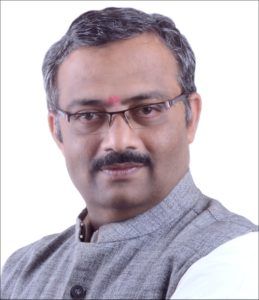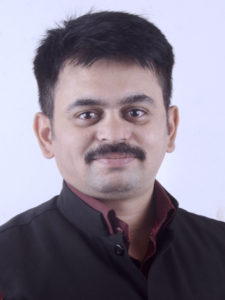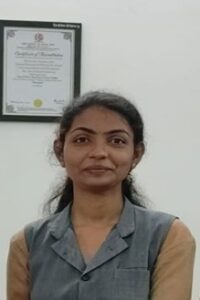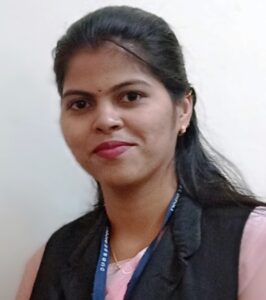The department was established in year 2009 and it was the first computer science department in dapoli. The objective is imparting quality education in the field of Computer Science. The department has modern facilities for teaching, learning. Department offers under graduate programme B.Sc Computer Science. The department aims to produce quality professionals holding important positions in the IT industry in India.

Prof. Kulkarni Digambar D.
Assistant Professor & Co-ordinator
M.Sc., M.Phil. (Physics)
Nanoferrites

Prof. Sadanand S. Dongare
Head of the Department
M.Sc., Computer Science
Java
Year of Joining 2014

Prof. Swapnil S. Salvi
Assistant Professor
M.Sc. Computer Science
SQL
Year of Joining 2017
Profile

Prof. Ms. Shravya S. Pawar
Assistant Professor
MSc IT, B.E.
Networking
Year of Joining 2018
Profile

Prof. Ms. Netranjali S. Mahadik
Assistant Professor
MSc CS, BS.c CS
Cyber Security
Year of Joining 2022
Profile
| Course Code | Course Type | Course Title | Credits | Lectures/Week |
| USCS101 | Core Subject | Digital Systems & Architecture | 2 | 3 |
| USCSP101 | Core Subject Practical | Digital Systems & Architecture – Practical | 1 | 3 |
| USCS102 | Core Subject | Introduction to Programming with Python | 2 | 3 |
| USCSP102 | Core Subject Practical | Introduction to Programming with Python – Practical | 1 | 3 |
| USCS103 | Core Subject | LINUX Operating System | 2 | 3 |
| USCSP103 | Core Subject Practical | LINUX Operating System – Practical | 1 | 3 |
| USCS104 | Core Subject | Open Source Technologies | 2 | 3 |
| USCSP104 | Core Subject Practical | Open Source Technologies – Practical | 1 | 3 |
| USCS105 | Core Subject | Discrete Mathematics | 2 | 3 |
| USCSP105 | Core Subject Practical | Discrete Mathematics – Practical | 1 | 3 |
| USCS106 | Core Subject | Descriptive Statistics | 2 | 3 |
| USCSP106 | Core Subject Practical | Descriptive Statistics – Practical | 1 | 3 |
| USCS107 | Ability Enhancement Course | Soft Skills | 2 | 3 |
| Course Code | Course Type | Course Title | Credits | Lectures/Week |
| USCS201 | Core Subject | Design & Analysis of Algorithms | 2 | 3 |
| USCSP201 | Core Subject Practical | Design & Analysis of Algorithms – Practical | 1 | 3 |
| USCS202 | Core Subject | Advanced Python Programming | 2 | 3 |
| USCSP202 | Core Subject Practical | Advanced Python Programming – Practical | 1 | 3 |
| USCS203 | Core Subject | Introduction to OOPs using C++ | 2 | 3 |
| USCSP203 | Core Subject Practical | Introduction to OOPs using C++ – Practical | 1 | 3 |
| USCS204 | Core Subject | Database Systems | 2 | 3 |
| USCSP204 | Core Subject Practical | Database Systems – Practical | 1 | 3 |
| USCS205 | Core Subject | Calculus | 2 | 3 |
| USCSP205 | Core Subject Practical | Calculus – Practical | 1 | 3 |
| USCS206 | Core Subject | Statistical Methods | 2 | 3 |
| USCSP206 | Core Subject Practical | Statistical Methods – Practical | 1 | 3 |
| USCS207 | Ability Enhancement Course | E-Commerce & Digital Marketing | 2 | 3 |
S.Y.B.Sc.
Syallabus – 4.210 S.Y.B.Sc. Computer Science Sem III & IV
| Semester | Course Code | Course Title | Weightage | Credits |
|
III |
USCS301 | Theory of Computation | 100 | 2 |
| USCS302 | Core JAVA | 100 | 2 | |
| USCS303 | Operating System | 100 | 2 | |
| USCS304 | Database Management Systems | 100 | 2 | |
| USCS305 | Combinatorics and Graph Theory | 100 | 2 | |
| USCS306 | Physical Computing and IoT Programming | 100 | 2 | |
| USCS307 | Skill Enhancement: Web Programming | 100 | 2 | |
| USCSP301 | USCS302+USCS303+USCS304 | 150 | 3 | |
| USCSP302 | USCS305+USCS306+USCS307 | 150 | 3 | |
|
IV |
USCS401 | Fundamentals of Algorithms | 100 | 2 |
| USCS402 | Advanced JAVA | 100 | 2 | |
| USCS403 | Computer Networks | 100 | 2 | |
| USCS404 | Software Engineering | 100 | 2 | |
| USCS405 | Linear Algebra using Python | 100 | 2 | |
| USCS406 | .NET Technologies | 100 | 2 | |
| USCS407 | Skill Enhancement: Android Developer Fundamentals |
100 | 2 | |
| USCSP401 | USCS401+ USCS402+ USCS403 | 150 | 3 | |
| USCSP402 | USCS405+ USCS406+ USCS407 | 150 | 3 |
T.Y.B.Sc.
Syallabus
4.211 T.Y.B.Sc. Computer Science Sem V & VI-1
4.212 T.Y.B.Sc. Computer Science (Web Design and Tech) Sem V & VI
| Semester | Course Code | Course Title | Weightage | Credits |
|
V |
USCS501 | Data Communication and Networking | 100 | 2.5 |
| USCS502 | Advanced Java Programming– I | 100 | 2.5 | |
| USCS503 | Mobile Application Development | 100 | 2.5 | |
| USCS504 | Data Management using PL/SQL-I | 100 | 2.5 | |
| USCSP501 | Practical of USCS501 + USCS502 | 100 | 3 | |
| USCSP501 | Practical of USCS503 + USCS504 | 100 | 3 | |
| USACWD501 | .Net Technologies | 100 | 2 | |
| USACWD5P1 | Practical of USACWD501 | 100 | 2 | |
|
VI |
USCS601 | Advanced Networking & Security | 100 | 2.5 |
| USCS602 | Advanced Java Programming – II | 100 | 2.5 | |
| USCS603 | Software Engineering and Testing | 100 | 2.5 | |
| USCS604 | Data Management using PL/SQL-II | 100 | 2.5 | |
| USCSP601 | Practical of USCS602 + USCS604 | 100 | 3 | |
| USCSP602 | Practical of USCS601 + USCS603 | 100 | 3 | |
| USACWD602 | Advanced Web Technology | 100 | 2 | |
| USACWD6P2 | Practical of USACWD602 | 100 | 2 |
PO & PSO
- Learner understsnds structure and function of operating system.
Learner is able to utilize his knowledge to formulate a database for real world entities. - Learner has capabilities to design formulations of computing models and its
applications in diverse areas. - Learner can analyse real world problems using statistical and combinatorial methods
- Learner demonstrates working of search engines using eigen values and eigen vectors in Linear Algebra.
- Learner applies his knowledge and skills to develop standalone applications.
- Learner has knowledge of embedded programming and robotics.
- Learner applies his skills knowledge to create dynamic websites using open source platforms.
Course Outcome
| Class | Semester | Course Code | Course Title | Course Outcomes |
| F.Y.B.Sc | I | USCS101 | Computer Organization and Design | 1) Learners learn about how computer systems work and underlying principles
2) Learners understand the basics of digital electronics needed for computers 3) Learners understand the basics of instruction set architecture for reduced and complex instruction sets 4) Learners understand the basics of processor structure and operation 5) Learners understand how data is transferred between the processor and I/O devices |
| USCS102 | Programming with Python- I | 1) Learners are able to understand the concepts of programming before actually starting to write programs. 2) Learners are able to develop logic for Problem Solving. 3) Learners are made familiar about the basic constructs of programming such as data, operations, conditions, loops, functions etc. 4) Learners are able to apply the problem solving skills using syntactically simple language |
||
| USCS103 | Free and Open Source Software | 1) Upon completion of this course, students have a good working knowledge of Open Source ecosystem, its use, impact and importance. 2) This course helps student to learn Open Source methodologies, case studies with real life examples. |
||
| USCS104 | Database Systems | 1) Students are able to evaluate business information problem and find the requirements of a problem in terms of data. 2) Learners are able to design the database schema with the use of appropriate data types for storage of data in database. 3) Learners are able to create, manipulate, query and back up the databases. |
||
| USCS105 | Discrete Mathematics | 1) Provides overview of theory of discrete objects, starting with relations and partially ordered sets. 2) Study about recurrence relations, generating function and operations on them. 3) Give an understanding of graphs and trees, which are widely used in software. 4) Provide basic knowledge about models of automata theory and the corresponding formal languages |
||
| USCS106 | Descriptive Statistics and Introduction to Probability |
1) Learner knows descriptive statistical concepts 2) Learner study probability concept required for Computer learner |
||
| USCS107 | Soft Skills Development | 1) Learner knows about various aspects of soft skills and learns ways to develop personality 2) Learners understand the importance and type of communication in personal and professional environment. 3) Provides insight into much needed technical and non-technical qualities in career planning. 4) Learners learn about Leadership, team building, decision making and stress management |
||
| II | USCS201 | Programming with C | 1) Learners are able to write, compile and debug programs in C language. 2) Learners are able to use different data types in a computer program. 3) Learners are able to design programs involving decision structures, loops and functions. 4) Learners are able to explain the difference between call by value and call by reference 5) Learners are able to understand the dynamics of memory by the use of pointers. 6) Learners are able to use different data structures and create/update basic data files. |
|
| USCS202 | Programming with Python– II | 1) Learners are able to understand how to read/write to files using python. 2) Learners are able to catch their own errors that happen during execution of programs. 3) Learners get an introduction to the concept of pattern matching. 4) Learners are made familiar with the concepts of GUI controls and designing GUI applications. 5) Learners are able to connect to the database to move the data to/from the application. 6) Learners know how to connect to computers, read from URL and send email |
||
| USCS203 | Linux | 1) Upon completion of this course, students have a good working knowledge of Linux, from both a graphical and command line perspective, allowing them to easily use any Linux distribution. 2) This course helps student to learn advanced subjects in computer science practically. 3) Learner are able to progress as a Developer or Linux System Administrator using the acquired skill set. |
||
| USCS204 | Data Structures | 1) Learns about Data structures, its types and significance in computing 2) Explores about Abstract Data types and its implementation 3) Ability to program various applications using different data structure in Python |
||
| USCS205 | Calculus | 1) Learner understands Mathematical concepts like limit, continuity, derivative, integration of functions. 2) Ability to appreciate real world applications which uses these concepts. 3) Learner are able to formulate a problem through Mathematical modeling and simulation |
||
| USCS206 | Statistical Methods and Testing of Hypothesis | 1) learner knows descriptive statistical concepts 2) Learner studies probability concept required for Computer learners |
||
| USCS207 | Green Technologies | 1) Learn about green IT can be achieved in and by hardware, software, network communication and data center operations. 2) Understand the strategies, frameworks, processes and management of green IT |
||
| S.Y.B.Sc | III | USCS301 | Theory of Computation | 1. Learner Understands Grammar and Languages 2. Learner Learns about Automata theory and its application in Language Design 3. Learner Learns about Turing Machines and Pushdown Automata 4. Learner understands Linear Bound Automata and its applications |
| USCS302 | Core JAVA | 1. Learner learns Object oriented programming concepts using Java. 2. Learner gains knowledge of input, its processing and getting suitable output. 3. Learner understands design, implement and evaluate classes and applets. 4. Learner gains knowledge and implementation of AWT package |
||
| USCS303 | Operating System | 1. To provide a understanding of operating system, its structures and functioning 2. Learner understands algorithms used by operating systems for various purposes. |
||
| USCS304 | Database Management Systems | 1. Learner masters concepts of stored procedure and triggers and its use. 2. Learner learns about using PL/SQL for data management 3. Learner understands concepts and implementations of transaction management and crash recovery |
||
| USCS305 | Combinatorics and Graph Theory | 1. Learner appreciates beauty of combinatorics and how combinatorial problems naturally arise in many settings. 2. Learner understands the combinatorial features in real world situations and Computer Science applications. 3. Learner applies combinatorial and graph theoretical concepts to understand Computer Science concepts and apply them to solve problems |
||
| USCS306 | Physical Computing and IoT Programming | 1. Learner understands System On Chip Architectures. 2. Learner learns Raspberry Pi with hardware and installation. 3. Learner learns physical interfaces and electronics of Raspberry Pi and program them using practical’s 4. Learner knows how to make consumer grade IoT safe and secure with proper use of protocols |
||
| USCS307 | Skill Enhancement: Web Programming | 1. Learner designs valid, well-formed, scalable, and meaningful pages using emerging technologies. 2. Learner understands the various platforms, devices, display resolutions, viewports, and browsers that render websites 3. Learner knows how to develop and implement client-side and server-side scripting language programs. 4. Learner gains knowledge to develop Database Driven Websites. 5. Learner learns to design and apply XML to create a markup language for data and document centric applications. |
||
| IV | USCS401 | Fundamentals of Algorithms | 1. Learner understans the concepts of algorithms for designing good program 2. Learner gains knowledge to implement algorithms using Python |
|
| USCS402 | Advanced JAVA | 1) Learner understands the concepts related to Java Technology 2) Learner explores and understands use of Java Server Programming |
||
| USCS403 | Computer Networks | 1. Learner are able to understand the concepts of networking, which are important for them to be known as a ‘networking professionals’. 2. Useful to proceed with industrial requirements and International vendor certifications |
||
| USCS404 | Software Engineering | 1. Learner learns various software development life cycle models.
2. Learner is able to model real world entities in appropriate models. 3. Learner is able to write test cases on a given software. |
||
| USCS405 | Linear Algebra using Python | 1. Appreciate the relevance of linear algebra in the field of computer science. 2. Understand the concepts through program implementation |
||
| USCS406 | NET Technologies | 1. Learner understands the .NET framework fundamentals. 2. After completing this course learner develops a proficiency in the C# programming language. 3. Proficiently develops ASP.NET web applications using C#. 4. Learner gains knowledge on how to use ADO.NET for data persistence in a web application. |
||
| USCS407 | Skill Enhancement: Android Developer Fundamentals |
1) Learner understands the requirements of Mobile programming environment. 2) Learner learns about basic methods, tools and techniques for developing Apps 3) Learner practices App development on Android Platform 4) Learners develop working prototypes of working systems for various uses in daily lives. |
||
| T.Y.B.Sc | V | USCS501 | Data Communication and Networking | 1. Learners are able to understand the concepts of networking, which are important for them. 2. Learner may proceed with International vendor certifications in Networking. |
| USCS502 | Advanced Java Programming– I | 1. Learner learns implementation of Advanced Java Programming
2. Learner is able to create Graphical User Interfaces using Swing 3. Learner performs database operations from Java |
||
| USCS503 | Mobile Application Development | 1) Learner understands the requirements of Mobile programming environment. 2) Learner learns about basic methods, tools and techniques for developing Apps |
||
| USCS504 | Data Management using PL/SQL-I | 1. Learner learns PL-SQL data types for storing various types of data.
2. Learner knows how to use loops, cursors and other constructs |
||
| USACWD501
|
.Net Technologies | 1. Learner gains Knowledge of .NET technologies framework 2. Learner understands and implements various controls for Creating a web Application 3. Learner understands the security aspects of web Application. |
||
| USCS601 | Advanced Networking & Security | 1. Learners are able to understand the concepts of networking and security, which are important for them to be known as a ‘networking professionals’. 2. Learner may proceed with International vendor certifications in Networking |
||
| USCS602 | Advanced Java Programming – II | 1. Learner learns advance web technologies like Servlets and JSP
2. Enables learners to create and use web services |
||
| USCS603 | Software Engineering and Testing | 1. Learner learns various software development life cycle models.
2. Learner is able to model real world entities in appropriate models. 3. Learner is able specify level of confidence on given software by performing software testing. |
||
| USCS604 | Data Management using PL/SQL-II | 1. Learner learns PL-SQL data types for storing various types of data.
2. Learner knows how to use loops, cursors and other constructs. |
||
| USACWD602 | Advanced Web Technology | 1. Learner learns about using XML for managing Data. 2. Learner learns about using Ajax programming. 3. Learner learns about PHP and jQuery for developing web applications. |
- Separate computer lab for T.Y.B.Sc students.
- ICT enabled Computer Laboratory for F.Y. and S.Y.B.Sc students
- Faculty room for Computer Department faculties
|
Year |
Students Appeared |
Students Passed |
Percentage Result |
‘O’ Grade |
‘A’ Grade |
‘B’ Grade |
‘C’ Grade |
‘D’ Grade |
‘E’ Grade |
|
2012-13 |
08 |
02 |
25% |
– |
– |
– |
02 |
– |
– |
|
2013-14 |
04 |
03 |
75% |
– |
– |
02 |
01 |
– |
– |
|
2014-15 |
16 |
10 |
43% |
– |
05 |
01 |
– |
01 |
– |
|
2015-16 |
07 |
04 |
57% |
– |
01 |
– |
02 |
01 |
– |
|
2016-17 |
07 |
05 |
71.42% |
– |
– |
03 |
02 |
– |
– |
To start post graduate course
